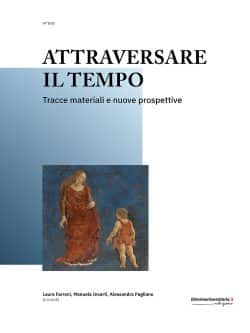Indice
a cura della Redazione di Civiltà e Religioni
As a Western category, “religion” develops historically from a monotheism, within which is inscribed, and an ancient civic universalism, the Roman res publica, in which it is rooted. This paper intends to discuss the various relationships between “civilization” and “religion” moving from three different contexts: i) the specific identification of “civilization” and “religion” in the modern and contemporary West; ii) the alternative vision and interpretation derived from the manifold missionary strategies from the East; and iii) the American missionary process, with its necessity to historically and culturally prioritise the civilizing process as a fundamental step towards the construction and establishment of a “religion” for its “savage” peoples.
The origin of the Latin alphabet is a recurrent theme not only in grammar texts but also in both historical and erudite works. According to all of them, the introduction of writing in Latium is to be traced back to a mythical past. While including the history of the litterae Latinae in the wider story of the invention of the alphabet and of its migrations, they refer to contrasting traditions regarding the inventores. However, the multi-faceted aspects of the mythical event reflect the various phases of the progress towards civilization, which is represented by the basic event of the acquisition of writing.
Deux textes parmi beaucoup d’autres révèlent le code du statut anthropologique duquel dépendaient les relations entre les Grecs et les Egyptiens: ils sont le Phèdre de Platon et le XVIe traité du Corpus Hermeticum. Ces deux textes, soit du point de vue d’une perspective grecque et soit de celui d’une Egypte écrasé par l’occupation, d’abord perse, puis grecque et enfin romaine, font allusion à un explicite aperçu ethnocentrique, joué en termes de culture, au niveau des connaissances, du savoir et de techniques de la communication.
This article considers the role played by Roger Bastide in the development of studies of religions and cultures of African origin in Brazil. Bastide’s interpretation of syncretism in religious phenomena has left its imprint on Afro-Brazilian studies. I will analyze two paradigms used by this author in his treatment of the logic of syncretism: the «principle of compartmentalization» and the opposition between material acculturation and formal acculturation. I will show how, within the Afro-American religious universe, one finds two types of differentially defined syncretism: an Afro-African syncretism, prior to slavery, that lays the foundation for the idea of a basic unity of African culture, and an Afro-western syncretism that one must fight today. The notion of «ritual panafricanism», which accounts for this «positive» syncretism between religions with a similar ancestry, revives the Afro-Brazilian vision of «unity in diversity» that is largely inspired by Bastidian theories.
The article moves from the observation of the perpetuation of religious images in contemporary Italian politics. More specifically, the affirmation of Berlusconism and the dissemination of hagiographies of the former Italian PM Silvio Berlusconi are here discussed as a kind of personality cult which in two decades fostered a wide range of hegemonic processes inside Italian society. The critical analysis herein presented takes inspiration from two profoundly different texts, separated by ideological orientation and history: the Sivasutras of Vasugupta and La Société du spectacle di Guy Debord. Mr Berlusconi’s political agenda has been repeatedly presented as a unifying exercise but eventually it revealed itself an unrestrained form of power which negatively impacted on both its perpetuator and its victims. Moving from the theory and practice of Yoga in Vasugupta and Debord’s devastating social critique, the implications of Berlusconi’s parable are examined as the apotheosis of uncontrolled power and ignorance. The paper ends with an evaluation of Yoga as a revolutionary tool to get vision over any totalitarianism.





